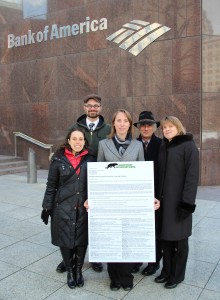 Perhaps it’s the weather or our coastal position, the intellectual attitudes or revolutionary roots–this much is clear: there is no shortage of enthusiasm in Boston to expose Bank of America (BofA) as the #1 financier of U.S. coal and climate change. We are responding to the climate emergency and we are illuminating its economic, social and environmental justice dimensions through powerful–if uncommon–partnerships.
Perhaps it’s the weather or our coastal position, the intellectual attitudes or revolutionary roots–this much is clear: there is no shortage of enthusiasm in Boston to expose Bank of America (BofA) as the #1 financier of U.S. coal and climate change. We are responding to the climate emergency and we are illuminating its economic, social and environmental justice dimensions through powerful–if uncommon–partnerships.
Over the past few months, Bostonians have demonstrated their concern about the impacts coal has on our communities, health, and economy. BofA treats customers poorly, charges higher fees more often, and likes to foreclose on American families while it repeatedly gets bailed out. In turn, it helps big coal companies like Alpha Natural Resources bail out negligent corporations like Massey Energy, which faced bankruptcy in 2011 after the worst U.S. mining disaster since 1970.
BofA gives the coal industry as a whole several billion dollars in financing each year–while championing 10 billion dollars over a 20 year investment period in largely undisclosed “green initiatives.” It continues to fund the mountaintop removal coal mining that destroys communities and ecosystems, the coal-fired power plants making families sick, and the coal export terminal development that would condemn already overburdened communities to another century of dirty energy infrastructure. Nobody is surprised.
In January activists, organizers, researchers, students, and scholars gathered to discuss Banks, Climate Justice and the Green Economy and BofA’s leading role in the extraction, transport, and burning of coal. In February we came together again in greater numbers and featured local musicians, justice activists, financial advisors, and film makers to dig deeper into BofA’s dirty truth: disregard for our clean energy, green jobs, affordable housing, and quality of life needs. Then last Wednesday, a small but mighty delegation delivered a demand letter to the bank that has been circulating all the while.
In a clear show of respect for RAN and our allies, a notable representative of distinct influence in the bank received our delivery, listened to statements from the two asset managers, the rabbi and the philanthropist in our group, and promised to pass the letter on to its intended recipient, CEO Brian Moynihan. Fifty people from a wide range of distinguished backgrounds had signed on to the letter asking BofA to phase out its funding of coal energy and redirect financing into cleaner, greener energy infrastructure. The icing on the cake was walking out to a larger group of justice allies protesting outside, calling the bank out and putting Boston on the NoCoalBofA map with Charlotte and the Bay Area.
Some of the people who signed may be familiar to you already: Noam Chomsky, Sut Jhally, and Bill McKibben. But who knew that we would receive such support from investment firms, 19 in all? All those who backed this letter understand that the true cost of coal comes on the backs of people who live near the plants, near the mines, and near the railroads that deliver toxic dust clouds over school yards. When these industry leaders come together with community activists to urge the bank to shift its financing, we CAN cut the cash that fuels the industry killing communities and infuse the renewable energy market with increased cash flow.
RAN is part of a growing culture of fossil fuel resistance taking shape in Boston, one that complements and connects with existing resistance power bases here. From campus divestment and keystone pipeline action, to faith community summits and the working groups of 350 Massachusetts, people are rising up and teaming up. They’re linking the dominant energy infrastructure to the struggles of low-income communities and communities of color. Add to this the collaborative progress of the Coal Free Mass coalition in coal plant host communities, the creative persistence of national housing justice leaders at City Life/Vida Urbana and very much alive and networked Occupy affinity groups, and you get a sense of the concurrent activity on the ground to kick our dirty energy habit and manifest climate justice.
A friend recently noted we should thank BofA for being the bank everyone loves to hate, uniting too often divergent movements around a common target. It’s a testament to our movement that people apply their unique experience and knowledge to win these shared fights. This is the network that defines the heart—and muscle—of everything we do at RAN. Whether its people protesting on the street, taking an online action, supporting groups we believe in or signing onto a letter, we are ensuring that our chorus does more than preach—it sings.